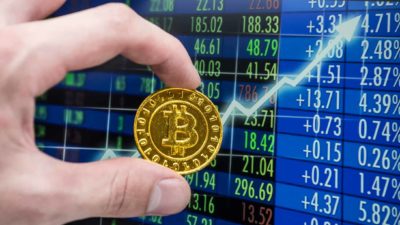A message from our CIO, Scott Phillips:
"G'day Fools. If you're like us, you're dismayed by the events taking place in Ukraine. It is an unnecessary humanitarian tragedy. Times like these remind us that money is important, but other things are far more valuable. And yet the financial markets remain open, shares are trading, and our readers and members are looking to us for guidance. So we'll do our best to continue to serve you, while also hoping for a swift and peaceful end to war in Ukraine."
————
The possibility of a Russian invasion of Ukraine has triggered anxious shivers into share markets and bond yields.
The presence of more than 100,000 military personnel along the border has sent a signal to the US and its allies that Vladimir Putin is not mucking about.
Financial markets are worried obviously because war itself would be damaging, but heavy economic sanctions against Russia could also cause major upheaval.
However, one expert reckons the flagship cryptocurrency, Bitcoin (CRYPTO: BTC), will flourish if fighting breaks out in eastern Europe.
Money that can't be confiscated
According to DeVere Group chief executive Nigel Green, "serious geopolitical risks" are bringing to light the real-life usefulness of cryptocurrencies.
"Research shows that Bitcoin donations are flooding into Ukrainian non-governmental organisations and volunteer groups," he said.
"The crowdfunding activities are, say experts, being used to equip the Ukrainian army with military and medical supplies."
Cryptocurrencies like Bitcoin are hosted on the blockchain, which removes centralised administration and provides anonymity.
So funds sent that way are less likely to be confiscated by unfriendly authorities.
"Meanwhile, Ukraine's adversary, Russia, is planning to regulate cryptocurrencies, with crypto legislation, including tax standards, expected as soon as next week," said Green.
"Both these rivals know that Bitcoin and cryptocurrencies can circumnavigate traditional financial institutions that might block transactions — as in crypto there's no central authority that can block payments."
An example of the advantages of decentralisation was demonstrated on the other side of the world last week.
Canada, like in Australia, saw a 'Freedom Convoy' protest against COVID-19 vaccination requirements.
A crowdfunding page to support the trucker protests was pulled down by the host site GoFundMe, citing lack of accountability in how the funds would be used.
"But, in response, crypto enthusiasts set up a crowdfunding campaign on the platform Tallycoin as an alternative way to raise money for the protestors."
So why has the Bitcoin price crashed?
Despite these bullish tailwinds, the value of Bitcoin has plunged more than 10% this year, and about 35% since November.
"This was triggered by a wider risk-off sentiment that also impacted many areas of global stock markets," said Green.
"Stock markets, like the crypto market, never move in a straight line, there are always peaks and troughs. Yet history teaches us that the long-term trajectories are predictable for both: they go up."
Green has previously espoused Bitcoin as an excellent store of value due to its programmatically enforced limited circulation of 21 million.
He added that the tense Ukraine situation has now highlighted to mainstream investors another of crypto's best attributes.
"Geopolitical issues this week have tested its other core values of being a viable decentralised, tamper-proof, 'unconfiscatable' monetary system," said Green.
"These real life use cases will further increase Bitcoin's mass adoption and lead to higher prices this year."









